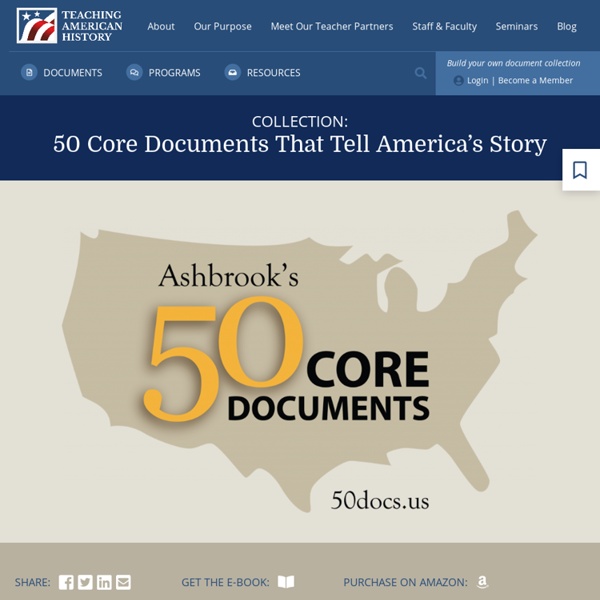



https://teachingamericanhistory.org/collections/50-core-documents/
Related: Social Studies • US HistoryNewspaper Map We have indexed all newspapers and plotted their correct locations, in 39 countries. Might have missed some. And most newspapers in another 199 countries, a bunch of them not in their correct locations. Add new ones here: add/correct "The immediate usefulness of Newspaper Map is readily apparent." The Contested History of American Freedom No idea is more fundamental to Americans' sense of ourselves as individuals and as a nation than freedom. The central term in our political vocabulary, freedom—or liberty, with which it is almost always used interchangeably—is deeply embedded in the record of our history and the language of everyday life. The Declaration of Independence lists liberty among mankind's inalienable rights; the Constitution announces securing liberty's blessings as its purpose. Freedom has often been invoked to mobilize support for war: the United States fought the Civil War to bring about "a new birth of freedom," World War II for the "Four Freedoms," the Cold War to defend the "Free World." The recently concluded war in Iraq was given the title "Operation Iraqi Freedom."
Wars 8" Self-Propelled Howitzer Photograph by SP6 Cybrary Man Utah Memorial - Pearl Harbor, Hawaii American Wars: Explore Military History Online Appraising the Electoral College - Bill of Rights Institute Every four years Americans head to the polls to select the presidential candidate they like best. Most people think their vote is a direct link to the candidate of their choice – but things aren’t quite that simple. In reality, individuals vote for an elector who has pledged to vote for a particular candidate. After the main election, these electors convene and cast their votes to determine who will become the next president.
13 Good Resources for Social Studies Teachers I recently met an old colleague of mine for breakfast. Steve and I team taught a course together for a couple of years before he retired a few years ago. During our conversation he said to me, "Richard, what I knew you were good at was finding things our students liked." Coming from Steve, whose opinions I hold in high regards, took that as a compliment and as a reminder that I haven't published a good list for fellow social studies teachers in quite a while.
Teaching History With Film: 'Lincoln', 'Argo' and 'Zero Dark Thirty' DreamWorks Pictures and 20th Century FoxDaniel Day-Lewis in Steven Spielberg’s film “Lincoln.” Three of this year’s Oscar contenders — “Lincoln,” “Argo” and “Zero Dark Thirty” — invite viewers to look at history, either through the lens of the distant past (as in the case of “Lincoln”) or through recent events (like “Zero Dark Thirty”), and to question the degree of truth and fiction at work in the retelling of these events. These same three movies have also prompted some serious debate and reflection on American politics, and the direction the nation should be headed. Below, we offer ways you can approach each film in the classroom, with critical thinking questions and related Times resources. While they are intended as jumping-off points for further discussion and reflection, you can also have students address these themes by writing their own movie reviews or scene analyses.
13 Good Resources for Social Studies Teachers I recently met an old colleague of mine for breakfast. Steve and I team taught a course together for a couple of years before he retired a few years ago. During our conversation he said to me, "Richard, what I knew you were good at was finding things our students liked." Coming from Steve, whose opinions I hold in high regards, took that as a compliment and as a reminder that I haven't published a good list for fellow social studies teachers in quite a while.
A More Perfect Union One of the most revolutionary aspects of the Constitution is “federalism,” the innovative system which created a strong national government while at the same time preserving much of the independence of the states. This delicate balance of power, seemingly hard-wired for disagreement and conflict, has served America well for more than two centuries. But it has also led to tensions throughout American history and still sparks controversy today. Peter Sagal travels across the country and meets many who believe that the federal government has grown too big, and assumed more power than the framers intended.
Internet History Sourcebooks Project Internet History Sourcebooks Project Paul Halsall, Editor Last Modified: Dec 11 | linked pages may have been updated more recently The Internet History Sourcebooks Project is a collection of public domain and copy-permitted historical texts presented cleanly (without advertising or excessive layout) for educational use. 1. Internationalizing Student Learning Outcomes in History: A Report to the American Council on Education The task force presented its final report in September 2005 to a national gathering of higher education administrators in Washington, DC. Committee Members: Noralee Frankel (American Historical Association); Kevin Gaines (University of Michigan); John Gillis (Rutgers University); Dane Kennedy (George Washington University), Chair; Patrick Manning (Northeastern University), Sonya Michel (University of Maryland at College Park); Kevin Reilly (Raritan Community College); and Peter N. Stearns (George Mason University). A. Introduction